The precision laser engraving machines market is anticipated to expand from USD 4,016.5 million in 2025 to USD 6,668.2 million in 2035, reflecting a steady CAGR of 5.2%. This steady growth is driven by rising demand for high-precision marking and engraving solutions across manufacturing, aerospace, automotive, medical, and electronics sectors. Increasing adoption of automation and CNC-integrated engraving systems is expected to sustain demand. Short-term trends indicate consistent year-on-year growth, supported by technological upgrades in laser sources, increased customization capabilities, and the growing need for intricate and precise engraving in high-value applications.
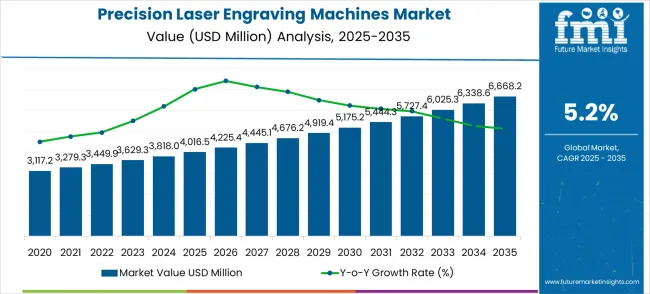
For the short-term forecast (2025–2027), the market is expected to exhibit gradual yet consistent growth. The market value increases from USD 4,016.5 million in 2025 to USD 4,676.2 million by 2027, representing an addition of USD 659.7 million. This period accounts for roughly 18.4% of total growth over the decade. Year-on-year increments of approximately USD 208–231 million demonstrate stable expansion, driven by adoption in industrial manufacturing and growing demand in personalized product markets. The Asia-Pacific region is likely to dominate this phase due to the rise of manufacturing hubs and investment in precision tooling technologies.
| Metric | Value |
|---|---|
| Market Value (2025) | USD 4,016.5 million |
| Market Forecast Value (2035) | USD 6,668.2 million |
| Forecast CAGR (2025-2035) | 5.2% |
For the mid-term (2028–2031), the market accelerates modestly from USD 4,919.4 million in 2028 to USD 6,025.3 million in 2031. This period contributes about USD 1,105.9 million to overall growth and reflects 30% of the total decade expansion. This phase will be shaped by advancements in high-speed fiber laser technology, improved engraving accuracy, and broader adoption in the medical device and electronics sectors. The integration of AI-assisted engraving control systems and improved machine efficiency will further boost growth. Europe and North America are expected to see notable adoption increases due to demand for precision components and premium products.
For long-term forecasting (2032–2035), the market is expected to increase from USD 6,338.6 million to USD 6,668.2 million, adding USD 329.6 million. This growth phase accounts for about 9% of total growth over the forecast period, reflecting a stabilizing trend. This tapering is consistent with the calculated CAGR and indicates a maturation stage where technology adoption rates plateau slightly. In an optimistic scenario, driven by breakthroughs in engraving speed and cost-effectiveness, the market is projected to exceed USD 7 billion by 2035. Slower adoption in mature markets or economic slowdowns could keep the market below USD 6,500 million by the end of the forecast period. The market trajectory reflects a stable and steady growth pattern with moderate acceleration in the medium term.
The market grows by enabling manufacturers to optimize production efficiency while accessing advanced processing technologies without substantial setup complexity. Manufacturing companies and processing facilities face mounting pressure to improve product customization and reduce operational costs, with precision laser engraving systems typically providing 60-75% faster processing times compared to traditional engraving alternatives, making advanced systems essential for competitive manufacturing positioning. The manufacturing industry's need for flexible processing capabilities and application-specific precision creates demand for comprehensive engraving solutions that can provide superior accuracy, maintain consistent quality, and ensure reliable operation without compromising production throughput or quality standards.
Government initiatives promoting advanced manufacturing and Industry 4.0 technologies drive adoption in industrial, electronics, and automotive applications, where precision processing has a direct impact on product quality and manufacturing efficiency. The technical complexity constraints during peak production periods and the expertise requirements for advanced laser system operation may limit accessibility among smaller manufacturers and developing regions with limited technical infrastructure for precision manufacturing equipment.
The market is segmented by material type, application, and region. By material type, the market is divided into metal laser engraving machines, non-metal laser engraving machines, hybrid material laser engraving machines, and others. Based on the application, the market is categorized into industrial manufacturing, jewelry and watches, electronic components, art and decoration, and others. Regionally, the market is divided into Asia Pacific, Europe, North America, and other key regions.
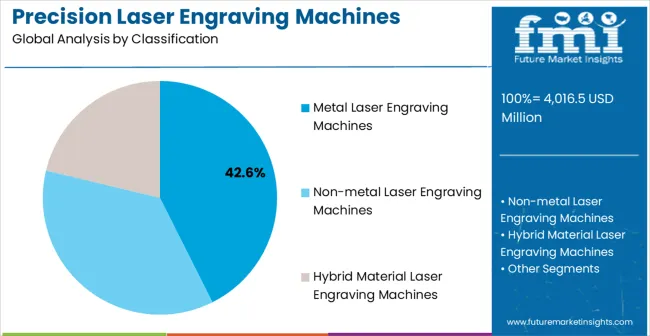
The metal laser engraving machines segment represents the dominant force in the precision laser engraving machines market, capturing approximately 42.6% of total market share in 2025. This advanced technology category encompasses systems featuring sophisticated metal processing capabilities and high-power laser technologies, including fiber laser systems and advanced control technologies that enable superior precision and processing speed across all metalworking conditions. The metal laser engraving machines segment's market leadership stems from its superior processing capabilities, with systems capable of handling diverse metal applications while maintaining consistent quality standards and operational reliability across all industrial environments.
The non-metal laser engraving machines segment maintains a substantial 31.4% market share, serving customers who require reliable processing performance with enhanced versatility features for materials like wood, plastic, and ceramics. These systems offer cost-effective solutions for medium-scale operations while providing sufficient precision capabilities to meet regional manufacturing and customization demands. The hybrid material laser engraving machines segment accounts for approximately 18.2% market share, focusing on applications requiring multi-material processing capabilities. The remaining market segments, categorized as specialty or application-specific systems, account for approximately 7.8% of the market, serving niche applications requiring specific processing configurations or specialized performance parameters.
Key technological advantages driving the metal laser engraving machines segment include:
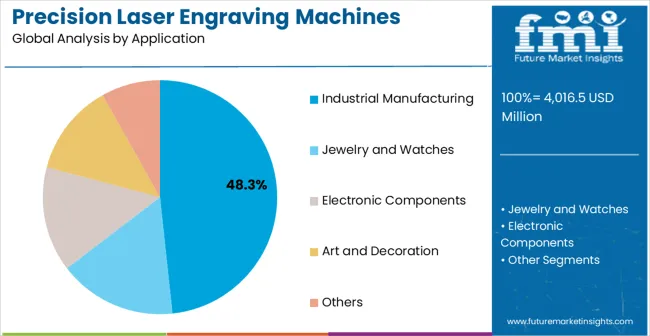
Industrial manufacturing applications dominate the precision laser engraving machines market with approximately 48.3% market share in 2025, reflecting the critical role of laser engraving in supporting global manufacturing operations and production efficiency worldwide. The industrial manufacturing segment's market leadership is reinforced by increasing automation trends, quality control requirements, and rising demand for precision processing solutions in automotive, aerospace, and machinery manufacturing projects across developed and emerging markets.
The jewelry and watches segment represents the second-largest application category, capturing 24.7% market share through specialized engraving requirements for precious metals, intricate designs, and high-precision detailing applications. This segment benefits from growing demand for customized jewelry solutions that meet specific aesthetic requirements, quality standards, and craftsmanship protocols in luxury goods manufacturing.
The electronic components segment accounts for 15.6% market share, serving circuit board marking, component identification, and precision electronics manufacturing across technology sectors. Art and decoration applications represent 7.8% market share, focusing on artistic engraving, personalization services, and decorative manufacturing. The other segment captures 3.6% market share, encompassing medical devices, signage, and specialized applications.
Key market dynamics supporting application growth include:
The market is driven by three concrete demand factors tied to manufacturing efficiency outcomes. First, the adoption of Industry 4.0 and manufacturing automation creates an increasing demand for precision processing systems, with automated manufacturing requirements expanding by 12-15% annually in major developing countries worldwide, necessitating comprehensive laser engraving infrastructure. Government initiatives promoting advanced manufacturing and digital transformation are driving the increased adoption of precision systems, with many industries expected to implement quality traceability standards for manufactured products by 2030. Technological advancements in laser technologies and control systems enable more efficient and cost-effective processing solutions that reduce setup times while improving processing accuracy and system reliability standards.
Market restraints include high equipment investment requirements for advanced laser systems that can deter new market entrants from developing comprehensive processing capabilities, particularly in developing regions where funding for precision manufacturing equipment remains limited. Technical complexity and the need for skilled operators pose another significant challenge, as advanced systems require specialized training and maintenance expertise, potentially leading to increased operational costs and productivity limitations. Regulatory compliance and safety requirements across different regions create additional operational challenges for system providers, demanding ongoing investment in safety features and compliance documentation.
Key trends indicate accelerated adoption in Asia-Pacific markets, particularly in China and India, where rapid industrialization and manufacturing expansion drive the adoption of comprehensive precision laser engraving systems. Technology integration trends toward intelligent control systems with AI-powered optimization, predictive maintenance capabilities, and integrated quality management solutions enable proactive processing approaches that reduce defects and operational downtime. The market thesis could face disruption if alternative processing methods or significant changes in manufacturing approaches minimize reliance on traditional laser engraving technologies.
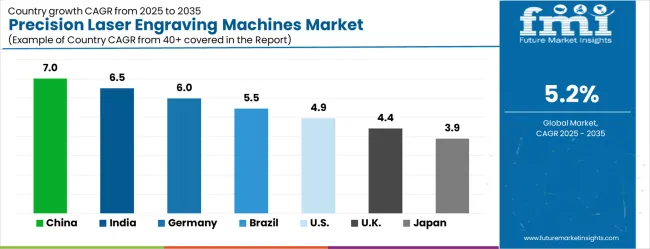
| Country | CAGR (2025-2035) |
|---|---|
| China | 7.0% |
| India | 6.5% |
| Germany | 6.0% |
| Brazil | 5.5% |
| USA | 4.9% |
| UK | 4.4% |
| Japan | 3.9% |
The market is gaining momentum worldwide, with China taking the lead thanks to massive manufacturing expansion and government-backed industrial automation programs. Close behind, India benefits from expanding manufacturing activities and digital transformation initiatives, positioning itself as a strategic growth hub in the Asia-Pacific region. Germany shows steady advancement, where integration of advanced laser technologies strengthens its role in the European manufacturing supply chain.
Brazil is focusing on industrial modernization and manufacturing development, signaling an ambition to capitalize on the growing opportunities in South American manufacturing markets. The USA stands out for its advanced technology adoption in existing manufacturing operations, and the UK and Japan continue to record consistent progress in precision manufacturing modernization. Together, China and India anchor the global expansion story, while the rest build stability and diversity into the market's growth path.
The report covers an in-depth analysis of 40+ countries; top-performing countries are highlighted below.
China demonstrates the strongest growth potential in the Precision Laser Engraving Machines Market with a CAGR of 7.0% through 2035. The country's leadership position stems from massive industrial development projects, government-backed manufacturing modernization programs, and stringent quality regulations driving the adoption of advanced laser engraving solutions. Growth is concentrated in major manufacturing areas, including Beijing, Shanghai, Guangzhou, and Shenzhen, where industrial facilities and manufacturing centers are implementing advanced precision engraving solutions for enhanced production efficiency and quality control. Distribution channels through state-owned manufacturing enterprises and government-approved suppliers expand deployment across industrial projects and manufacturing development initiatives. The country's Made in China 2025 strategy provides policy support for manufacturing modernization, including advanced laser engraving system adoption.
Key market factors:
In Mumbai, Delhi, Bangalore, and Chennai, the adoption of comprehensive precision laser engraving solutions is accelerating across manufacturing projects and industrial development initiatives, driven by rapid industrialization and government manufacturing programs. The market demonstrates strong growth momentum with a CAGR of 6.5% through 2035, linked to comprehensive industrial development and increasing focus on precision manufacturing solutions. Indian manufacturers are implementing advanced laser engraving systems and processing platforms to enhance production quality while meeting growing demand in expanding automotive development and electronics sectors. The country's Make in India initiative creates constant demand for precision laser engraving solutions, while increasing focus on export quality drives adoption of advanced processing control systems.
Germany's advanced manufacturing sector demonstrates sophisticated implementation of precision laser engraving solutions, with documented case studies showing 35% productivity improvement in manufacturing operations through intelligent processing control platforms. The country's industrial infrastructure in major manufacturing centers, including Munich, Berlin, Hamburg, and Frankfurt, showcases integration of advanced laser technologies with existing production systems, leveraging expertise in precision engineering and manufacturing technologies. German manufacturers emphasize quality and precision standards, creating demand for high-performance laser engraving solutions that support continuous improvement initiatives and production optimization requirements. The market maintains steady growth through focus on Industry 4.0 integration and quality compliance, with a CAGR of 6.0% through 2035.
Key development areas:
Brazil's market expansion is driven by diverse manufacturing demand, including automotive production in São Paulo and industrial components in other major cities, and comprehensive manufacturing modernization across multiple states. The country demonstrates promising growth potential with a CAGR of 5.5% through 2035, supported by federal government industrial investment programs and state-level manufacturing development initiatives. Brazilian manufacturers face implementation challenges related to equipment financing constraints and technical expertise availability, requiring phased deployment approaches and support from international suppliers. The growing manufacturing demands and quality requirements create compelling business cases for precision laser engraving adoption, particularly in urban areas where production efficiency has a direct impact on market competitiveness.
Market characteristics:
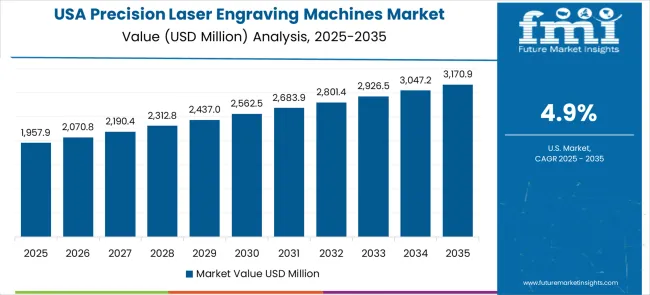
The USA market leads in advanced precision laser engraving innovation based on integration with intelligent manufacturing systems and automation technologies for enhanced operational performance. The country shows strong potential with a CAGR of 4.9% through 2035, driven by the modernization of existing manufacturing infrastructure and the expansion of technology-enabled production facilities in major industrial areas, including Michigan, California, Texas, and Ohio. American manufacturers are adopting intelligent laser engraving systems for quality improvement and regulatory compliance, particularly in regions with advanced manufacturing requirements and aerospace applications demanding comprehensive processing upgrades. Technology deployment channels through established manufacturing contractors and system integrators expand coverage across production facilities and manufacturing operators.
Leading market segments:
In London, Manchester, Birmingham, and Glasgow, manufacturing facilities are implementing comprehensive precision laser engraving solutions to modernize existing production infrastructure and improve processing quality, with documented case studies showing a 30% reduction in processing time through advanced laser systems. The market shows moderate growth potential with a CAGR of 4.4% through 2035, linked to the ongoing modernization of manufacturing facilities, industrial networks, and emerging smart manufacturing projects in major cities. British manufacturers are adopting intelligent laser engraving and monitoring platforms to enhance production reliability while maintaining quality standards demanded by the automotive and aerospace industries. The country's established manufacturing infrastructure creates constant demand for system upgrade and modernization solutions that integrate with existing production systems.
Market development factors:
Japan's Precision Laser Engraving Machines Market demonstrates sophisticated implementation focused on precision manufacturing and operational excellence optimization, with documented integration of advanced laser systems, achieving 40% improvement in processing precision across manufacturing and industrial facilities. The country maintains steady growth momentum with a CAGR of 3.9% through 2035, driven by manufacturing facilities' focus on quality standards and continuous improvement methodologies that align with lean manufacturing principles applied to production operations. Major metropolitan areas, including Tokyo, Osaka, Nagoya, and Fukuoka, showcase advanced deployment of intelligent laser platforms where processing systems integrate seamlessly with existing manufacturing control systems and comprehensive quality management programs.
Key market characteristics:
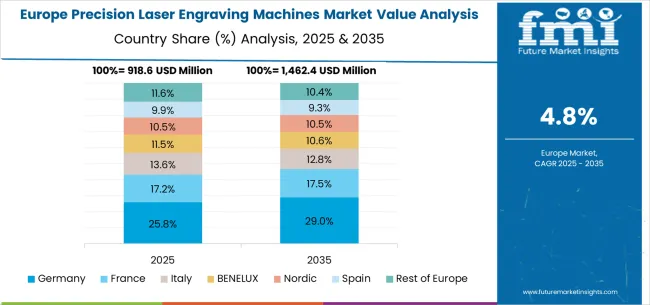
The precision laser engraving machines market in Europe is projected to grow from USD 1,004.1 million in 2025 to USD 1,667.1 million by 2035, registering a CAGR of 5.2% over the forecast period. Germany is expected to maintain its leadership position with a 33.8% market share in 2025, declining slightly to 33.4% by 2035, supported by its extensive manufacturing infrastructure and major industrial centers, including Munich, Berlin, and Frankfurt manufacturing facilities.
The United Kingdom follows with an 18.6% share in 2025, projected to reach 18.9% by 2035, driven by comprehensive manufacturing modernization programs in London, Manchester, and other industrial areas implementing advanced laser systems. France holds a 16.4% share in 2025, expected to maintain 16.0% by 2035 through the ongoing development of manufacturing facilities and industrial networks. Italy commands a 13.2% share, while Spain accounts for 9.8% in 2025. The Rest of Europe region is anticipated to gain momentum, expanding its collective share from 8.2% to 9.8% by 2035, attributed to increasing precision laser engraving adoption in Nordic countries and emerging Eastern European manufacturing facilities implementing industrial development programs.
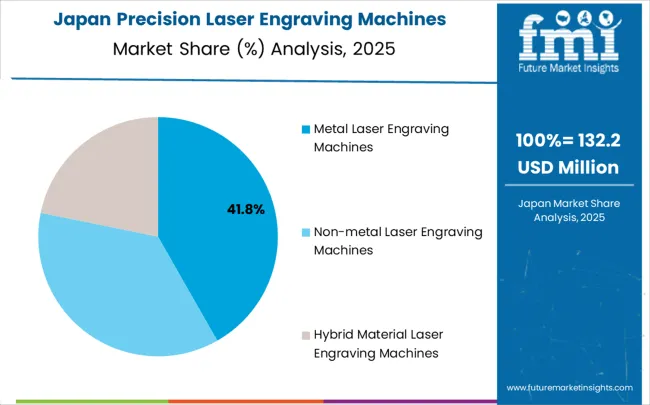
The Japanese Precision Laser Engraving Machines Market demonstrates a mature and precision-focused landscape, characterized by sophisticated integration of metal laser engraving systems with existing manufacturing infrastructure across industrial facilities, production networks, and automated manufacturing lines. Japan's focus on operational excellence and quality standards drives demand for high-reliability laser engraving solutions that support kaizen continuous improvement initiatives and statistical process control requirements in manufacturing operations.
The market benefits from strong partnerships between international laser providers like Trumpf, Coherent, and domestic technology leaders, including Amada, creating comprehensive service ecosystems that prioritize system reliability and operator training programs. Manufacturing centers in Tokyo, Osaka, Nagoya, and other major industrial areas showcase advanced precision implementations where laser systems achieve 98% processing accuracy through integrated monitoring programs.
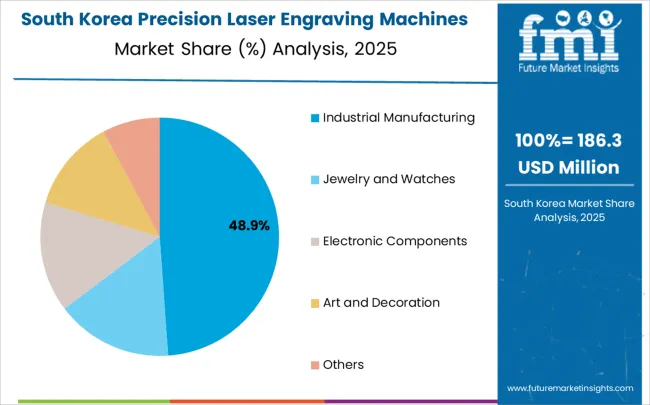
The South Korean Precision Laser Engraving Machines Market is characterized by strong international technology provider presence, with companies like Trumpf, Han's Laser, and Coherent maintaining dominant positions through comprehensive system integration and technical services capabilities for manufacturing facilities and industrial applications. The market is demonstrating a growing focus on localized technical support and rapid response capabilities, as Korean manufacturers increasingly demand customized solutions that integrate with domestic manufacturing infrastructure and advanced production control systems deployed across the Seoul Metropolitan Area and other major industrial cities.
Local manufacturing companies and regional service integrators are gaining market share through strategic partnerships with global providers, offering specialized services including technical training programs and certification services for laser operation specialists. The competitive landscape shows increasing collaboration between multinational laser companies and Korean manufacturing specialists, creating hybrid service models that combine international engineering expertise with local market knowledge and customer relationship management.
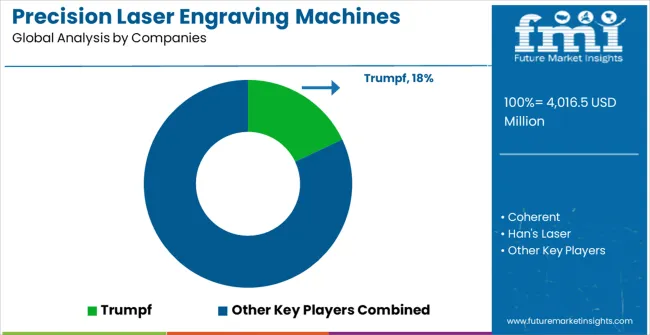
The market features approximately 35-45 meaningful players with moderate concentration, where the top three companies control roughly 30-37% of global market share through established technology portfolios and extensive manufacturing industry relationships. Competition centers on processing precision, system reliability, and technical capabilities rather than price competition alone.
Market leaders include Trumpf, Coherent, and Han's Laser, which maintain competitive advantages through comprehensive laser system portfolios, global service networks, and deep expertise in the manufacturing and industrial sectors, creating high switching costs for customers. These companies leverage established technical relationships and ongoing service contracts to defend market positions while expanding into adjacent manufacturing and processing applications.
Challengers encompass Gravotech and Trotec Laser, which compete through specialized engraving solutions and strong regional presence in key manufacturing markets. Technology specialists, including Epilog Laser, Universal Laser Systems, and IPG Photonics, focus on specific laser technologies or vertical applications, offering differentiated capabilities in fiber lasers, CO2 systems, and application-specific solutions.
Regional players and emerging technology providers create competitive pressure through cost-effective solutions and rapid deployment capabilities, particularly in high-growth markets including China and India, where local presence provides advantages in customer support and regulatory compliance. Market dynamics favor companies that combine advanced laser technologies with comprehensive technical services that address the complete manufacturing lifecycle from system design through ongoing performance optimization and maintenance support.
Precision laser engraving machine solutions represent a critical manufacturing technology that enables manufacturers, job shops, and industrial facilities to enhance processing accuracy and production efficiency without substantial setup complexity, typically providing 60-75% faster processing times compared to traditional engraving alternatives. With the market projected to grow from USD 4,016.5 million in 2025 to USD 6,668.2 million by 2035 at a 5.2% CAGR, these solutions offer compelling advantages - superior precision, enhanced productivity, and versatile processing capabilities - making them essential for industrial manufacturing (48.3% market share), jewelry and watches operations (24.7% share), and diverse electronics applications seeking reliable precision processing solutions. Scaling market penetration and technical capabilities requires coordinated action across manufacturing policy, industry standards, laser manufacturers, system providers, and research institutions.
How Governments Could Spur Local Production and Adoption?
How Industry Bodies Could Support Market Development?
How Manufacturers and Technology Players Could Strengthen the Ecosystem?
How Suppliers Could Navigate the Shift?
How Investors and Financial Enablers Could Unlock Value?
| Item | Value |
|---|---|
| Quantitative Units | USD 4,016.5 million |
| Material Type | Metal Laser Engraving Machines, Non-metal Laser Engraving Machines, Hybrid Material Laser Engraving Machines, Others |
| Application | Industrial Manufacturing, Jewelry and Watches, Electronic Components, Art and Decoration, Others |
| Regions Covered | Asia Pacific, Europe, North America, Latin America, Middle East & Africa |
| Country Covered | China, India, Germany, Brazil, the USA, the UK, Japan, and 40+ countries |
| Key Companies Profiled | Trumpf, Coherent, Han's Laser, Gravotech, Trotec Laser, Epilog Laser, Universal Laser Systems, Bystronic, Amada, Rofin-Sinar, IPG Photonics, LaserStar Technologies, TYKMA Electrox, MORN Laser, LVD Group |
| Additional Attributes | Dollar sales by material type and application categories, regional adoption trends across Asia Pacific, Europe, and North America, competitive landscape with laser system providers and technology integrators, manufacturing facility requirements and specifications, integration with Industry 4.0 initiatives and automation platforms, innovations in laser technology and control systems, and development of specialized applications with precision and efficiency capabilities. |
The global precision laser engraving machines market is estimated to be valued at USD 4,016.5 million in 2025.
The market size for the precision laser engraving machines market is projected to reach USD 6,668.2 million by 2035.
The precision laser engraving machines market is expected to grow at a 5.2% CAGR between 2025 and 2035.
The key product types in precision laser engraving machines market are metal laser engraving machines, non-metal laser engraving machines and hybrid material laser engraving machines.
In terms of application, industrial manufacturing segment to command 48.3% share in the precision laser engraving machines market in 2025.






Our Research Products

The "Full Research Suite" delivers actionable market intel, deep dives on markets or technologies, so clients act faster, cut risk, and unlock growth.

The Leaderboard benchmarks and ranks top vendors, classifying them as Established Leaders, Leading Challengers, or Disruptors & Challengers.

Locates where complements amplify value and substitutes erode it, forecasting net impact by horizon

We deliver granular, decision-grade intel: market sizing, 5-year forecasts, pricing, adoption, usage, revenue, and operational KPIs—plus competitor tracking, regulation, and value chains—across 60 countries broadly.

Spot the shifts before they hit your P&L. We track inflection points, adoption curves, pricing moves, and ecosystem plays to show where demand is heading, why it is changing, and what to do next across high-growth markets and disruptive tech

Real-time reads of user behavior. We track shifting priorities, perceptions of today’s and next-gen services, and provider experience, then pace how fast tech moves from trial to adoption, blending buyer, consumer, and channel inputs with social signals (#WhySwitch, #UX).

Partner with our analyst team to build a custom report designed around your business priorities. From analysing market trends to assessing competitors or crafting bespoke datasets, we tailor insights to your needs.
Supplier Intelligence
Discovery & Profiling
Capacity & Footprint
Performance & Risk
Compliance & Governance
Commercial Readiness
Who Supplies Whom
Scorecards & Shortlists
Playbooks & Docs
Category Intelligence
Definition & Scope
Demand & Use Cases
Cost Drivers
Market Structure
Supply Chain Map
Trade & Policy
Operating Norms
Deliverables
Buyer Intelligence
Account Basics
Spend & Scope
Procurement Model
Vendor Requirements
Terms & Policies
Entry Strategy
Pain Points & Triggers
Outputs
Pricing Analysis
Benchmarks
Trends
Should-Cost
Indexation
Landed Cost
Commercial Terms
Deliverables
Brand Analysis
Positioning & Value Prop
Share & Presence
Customer Evidence
Go-to-Market
Digital & Reputation
Compliance & Trust
KPIs & Gaps
Outputs
Full Research Suite comprises of:
Market outlook & trends analysis
Interviews & case studies
Strategic recommendations
Vendor profiles & capabilities analysis
5-year forecasts
8 regions and 60+ country-level data splits
Market segment data splits
12 months of continuous data updates
DELIVERED AS:
PDF EXCEL ONLINE
Precision Livestock Farming Market Size and Share Forecast Outlook 2025 to 2035
Precision Wire Drawing Service Market Size and Share Forecast Outlook 2025 to 2035
Precision Planting Market Size and Share Forecast Outlook 2025 to 2035
Precision Bearing Market Size and Share Forecast Outlook 2025 to 2035
Precision Analog Potentiometer Market Size and Share Forecast Outlook 2025 to 2035
Precision Blanking Dies Market Size and Share Forecast Outlook 2025 to 2035
Precision Components And Tooling Systems Market Size and Share Forecast Outlook 2025 to 2035
Precision Chemicals Market Size and Share Forecast Outlook 2025 to 2035
Precision Fermentation Ingredients Market Size and Share Forecast Outlook 2025 to 2035
Precision-Fermented Casein for QSR Pizza Cheese Market Analysis - Size, Share, and Forecast Outlook 2025 to 2035
Precision Ruminant Minerals Market Analysis - Size and Share Forecast Outlook 2025 to 2035
Precision Forestry Market Size and Share Forecast Outlook 2025 to 2035
Precision Stainless Steel Market Size and Share Forecast Outlook 2025 to 2035
Precision Machine For Polymers Market Size and Share Forecast Outlook 2025 to 2035
Precision Aquaculture Market Size and Share Forecast Outlook 2025 to 2035
Precision Fermented Functional Lipids Market Analysis Size and Share Forecast Outlook 2025 to 2035
Precision Gearbox Machinery Market Trends and Forecast 2025 to 2035
Precision Cancer Imaging Market Growth - Industry Trends & Forecast 2025 to 2035
Precision Poultry Nutrition Market – Growth, Demand & Livestock Trends
Precision Agriculture Market

Thank you!
You will receive an email from our Business Development Manager. Please be sure to check your SPAM/JUNK folder too.
Chat With
MaRIA